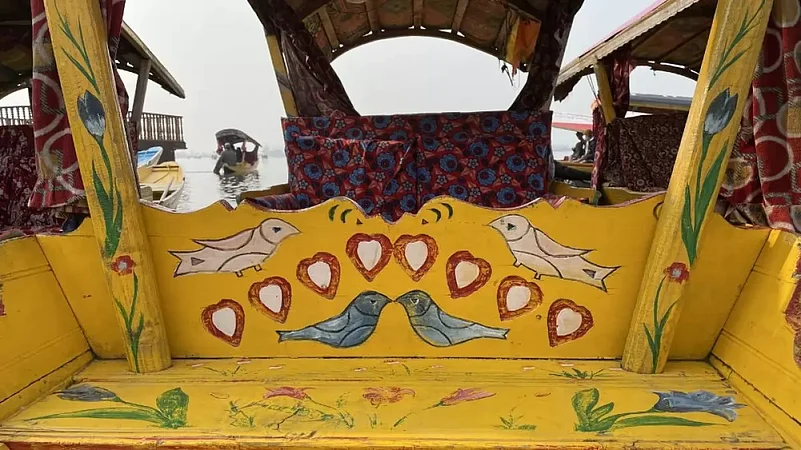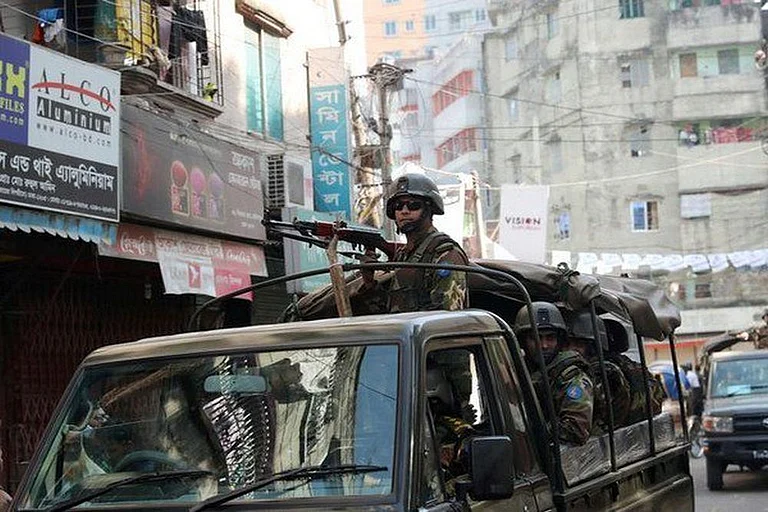When the heat became torturous, when farmers began to worry that the sun would crack open the dry earth, when the cattle started huddling around searching for shade and water, when mothers took to forbidding children from stepping outdoors even for a bit lest the hot winds scorch them, the mynahs flew in and soon thereafter, the monsoons. Bathing in the showers, the fields began to dance, the leaping frogs croaked, and the wet soil, bursting with fragrance, invited farmers and children to frisk and frolic. Hopeful of a bountiful cotton harvest, Noor Mahal swam in monsoon euphoria. Bidding bye to the hot summer, the village welcomed the downpour as it rose and ebbed, going away for a day or so only to return with verve.
Children bathed in the rain, floated paper boats in puddles, munched on gulgullas that grandmothers fried in large woks. The air was resplendent with song, dance, the beating of drums and the aroma of malpuaas and kheer. Everyone was basking in monsoon fervour, everyone but Kishan.
His nose was in his books. Monsoons had brought along not only rains and celebrations but also high school tests. Aiming for good scores, Kishan shut himself in the house with his books. Turning a deaf ear to the cooing of the mynahs, he trudged like a donkey. Good scores could change his life. He strove his hardest, practising his math facts over and again and reading his books till he fell asleep, only to start practising his math facts and reading his books again as soon as he woke up. On the days of the tests, he was excited, eager to take them and get them out of the way.
After the tests, he dashed to the jamun tree in the schoolyard, ecstatic to have caught the tail end of the rains before they slinked away with the last of the jamuns. Gulping jamuns, his mouth smeared with purple juice, he waited for Roop by the trees behind her house. The sprightly wind was beating to the rhythm of the season. Swinging to it, Kishan hummed a verse that he had memorised for Roop from the love poem Heer.
As wine-addicts cannot give up wine,
As opium-eaters cannot live without opium,
So, I cannot breathe without my lover.
As the stain of mango juice cannot be washed away from clothes,
So, the stain of love cannot be wiped off a lovestruck heart.
He waited and waited, his patience running out. First, he hadn’t seen Roop in thirty days. Then, it was the monsoon, heavier than ever that year. Caught between the two, he was lovesick. How would he be able to keep his hands off her?
Roop came in. She had gone cucumber picking, she said, and had got delayed. She was distracted and jittery.
“Sing me the verse that you had promised to sing. Make it fast before the rain comes again,” she said hurriedly.
“Wah! Someone’s in the mood for romantic poetry! But wait a minute. That’s how you greet me? After a month? Let the rain come. Won’t you ask how I did on the tests?” Kishan said.
“Oh yes! The tests? How did you do?” she asked.
“I will soon be packing my things,” he winked. Random drops of rain began falling from the skies.
“But you will return for the holidays? Won’t you?” she asked.
“Someone’s missing me even before I’ve left,” he said.
Who said anything about missing?” she pouted.
“How long will you be in college?”
“A few years. Then I will be a government officer and all the girls from here, there and everywhere would want to be my wife,” he smirked, raindrops hitting his head, trickling down his face.
“Oh really! In that case, you’ll have a hard time picking a girl,” she said, looking away.
“I won’t have to bother with picking. You know that,” he laughed.
“I know nothing. Now stop laughing as if the Princess of Paradise is dying to marry you,” she frowned.
“Why, yes. She is a princess indeed. And there is nothing that she wants more than to marry me even though she wouldn’t EVER say it,” he smiled.
Blood rushed to her face. She looked down. He felt her breath on his kurta. His heart pounded against his ribs. Bending, he drank in the smell of her hair. It was a delicious, layered-with-promise scent of wet fields and wild flowers, of playful breeze and fresh corn. He imagined her wedding dress. What colour would she choose? Red? Orange? Magenta?
“Yes! Magenta,” his mind whispered.
Just then she looked up, her face glowing, her hair dripping raindrops.
“What colour?” he asked.
“Magenta,” she replied, turning pink.
Blown away by that meeting of minds, he gazed at her in wonder. She was flushing irrepressibly. Their eyes met. He leaned. She moved closer. Greedily, they kissed and kissed, his hands feeling her curves, fondling her hair. In the bushes, the mynahs cooed. The unsung verse from the love poem played in his head.
In the days that followed, Kishan remembered the kiss with frenzy, adrenalin rushing through him like a flash of lightning. Most of all, he remembered how the kiss tasted. Sweet. Sweeter than the looping bright orange jalebis in Ramdeen’s sweet shop, sweeter still than the sugarcane flaming in the faraway fields.
(An extract from ‘The Rainbow Acres’ (Om Books), a historical novel by Simrita Dhir, with permission from the author. Dhir is a California-based academic and novelist. Views expressed in this article are personal and may not necessarily reflect the views of Outlook Magazine.)





















